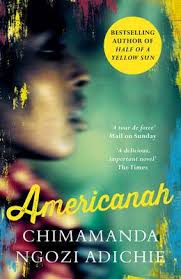Americanah
Chimamanda Ngozi Adichie
London, HarperCollins, 2013, 477p
Having grown up in Nigeria, Ifemelu has a fascinating outlook on life in America. She first moved there for university, and over the years, struggles through relative poverty to eventually achieve success with a blog in which she writes about race from the perspective of a 'non-American black'.
Meanwhile, in Nigeria, her high school boyfriend, Obinze, has become a wealthy business man, despite a short illegal stint in England. After many years apart, Ifemelu starts to wonder about Obinze, and when she decides to move back to Nigeria, she gets in touch with him. Americanah tells of their lives during the years spent apart, and builds towards a reunion that is perhaps not as simple as either would have wished.
Although sold as a love story, Americanah is about so much more than this couple's romance. A large chunk of the novel is dedicated to Ifemelu's observations about race in the USA, highlighting how complicated and unconsciously embedded racism is, and exploring the relationships between different minority groups. This is what I found most gripping - the social commentary about the way race and racism is percieved by the people who are most subject to it. Some of her thoughts made me cringe, embarassed that anyone could ever say or act in such a way; whilst other passages made me reflect on myself and my behaviours, wondering if I had made such ignorant mistakes. And, equally fascinating as her experiences in America were her experiences on returning to Nigeria having been away for so long, faced with a new, different sort of prejudice.
But in becomming enthralled by Ifemelu's commentary, I found myself attached to the character, willing her relationship with Obinze to succeed. Yet, for me, the romance pales in comparison to the story of their journey to the point of reunion.
I love Adichie's style of writing - it is direct and clear, and she effectively balances the voices of Obinze and Ifemelu, allowing both to tell their own stories through an omniscient third person narrative. Her novels are long (and I cannot wait to read another), but they do not feel heavy or difficult; instead, they are a delightful breeze on which to float.

No comments:
Post a Comment